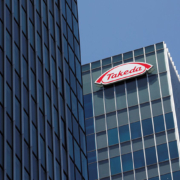Merck axes two Keytruda Phase III cancer trials due to disappointing data
Merck axes two Keytruda Phase III cancer trials due to disappointing data
Merck announced on Thursday that it will discontinue two late-stage studies looking at its blockbuster PD-1 inhibitor Keytruda (pembrolizumab) in lung and skin cancer, following poor outcomes.
The pharma is terminating the Phase III KEYNOTE-867 in non-small cell lung cancer (NSCLC) after an interim analysis showed that Keytruda, when administered alongside stereotactic body radiotherapy (SBRT), did not significantly improve event-free survival or overall survival in patient with stage I or II disease.
In terms of safety, the Keytruda plus SBRT combination elicited a higher rate of adverse events, including some that led to death, than placebo plus SBRT. Given these findings, the benefit/risk profile of the Keytruda regimen in this indication does not support pushing through with the trial, according to Merck.
The pharma is also ending the Phase III KEYNOTE-630 study, which looked at adjuvant Keytruda for patients with high-risk locally advanced cutaneous squamous cell carcinoma (cSCC) who had undergone surgery and radiation. Placebo was used as a comparator.
During a pre-analysis, an independent data monitoring committee recommended that KEYNOTE-630 be stopped due to futility after Keytruda failed to meet statistical significance for the primary endpoint of recurrence-free survival. Overall survival, a key secondary outcome, was not formally tested, though figures at the time of the pre-analysis did not favor Keytruda, according to Merck.
Keytruda’s safety profile in KEYNOTE-630 was consistent with what had been established in prior studies.
Merck has notified the study investigators of the termination and enrolled patients are advised to coordinate with their healthcare providers for alternative treatment options. The company will continue to analyze data from the two trials and will share its findings with regulatory authorities and the broader scientific community.
Thursday’s announcement continues a losing streak for Keytruda, which in recent months has run into clinical challenges.











